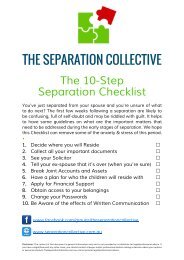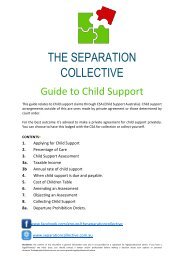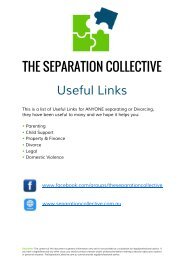Ultimate guide to selling FSBO
You also want an ePaper? Increase the reach of your titles
YUMPU automatically turns print PDFs into web optimized ePapers that Google loves.
1
2
TABLE OF<br />
CONTENTS<br />
1. Preface / Agent Point of View<br />
2. Pricing your home<br />
3. Going on the Market<br />
4. The Downsides of Using MLS<br />
5. Be a True <strong>FSBO</strong><br />
6. Be Fair and be Aware<br />
7. Be careful how your Describe your home<br />
8. Disclosures<br />
9. Don’t Over-Show You Home<br />
10. Open Homes, are they worth Doing<br />
11. Twelve Open House Tips<br />
12. Dealing with Calls from Agents<br />
13. 6 Things <strong>to</strong> consider if an Agent has a Buyer for your home<br />
14. Watch the Market Weekly<br />
15. Make sure your Prospects<br />
16. Buyers will try and pick your pocket<br />
17. D.B.D<br />
18. Negotiating<br />
19. Dealing with buyer’s remorse<br />
20. What’s that in your Ear<br />
21. How Earnest is our Buyer<br />
22. You can’t do everything yourself<br />
23. Dealing with Inspection Issues<br />
24. Dealing with the Appraisal<br />
25.Stay on <strong>to</strong>p of the Mortgage<br />
26. Don’t forget Town Certifications/Inspections<br />
Page<br />
4<br />
6<br />
7<br />
8<br />
11<br />
13<br />
14<br />
15<br />
17<br />
18<br />
19<br />
21<br />
22<br />
23<br />
24<br />
26<br />
27<br />
28<br />
29<br />
31<br />
32<br />
33<br />
36<br />
37<br />
38<br />
39<br />
3
1. PREFACE – AGENT<br />
POINT OF VIEW<br />
It probably seems a little weird<br />
that I want <strong>to</strong> help you sell<br />
your home on your own, being<br />
that I'm a real estate agent.<br />
You're probably thinking<br />
there's got <strong>to</strong> be a catch...<br />
The truth is, I get it. I <strong>to</strong>tally understand<br />
wanting <strong>to</strong> try and sell your home on<br />
your own and save some money.<br />
I do some things on my own, and don't<br />
hire a professional (when I can), in<br />
order <strong>to</strong> save some money. Sometimes<br />
I do it as good or better than<br />
someone I could've hired.<br />
Sometimes I struggle and get it done<br />
OK enough. And sometimes, I get<br />
in<strong>to</strong> the middle of it and end up<br />
hiring someone anyway.<br />
Let's use painting my house, for<br />
example...<br />
Let's say I decided <strong>to</strong> paint the<br />
outside of my house on my own, and<br />
a professional painter saw me trying.<br />
And, instead of just driving on by<br />
and letting me be, every chance he<br />
4
got he kept coming up and bugging<br />
me...<br />
"Hey, you want me <strong>to</strong> paint your<br />
house for you? I can <strong>to</strong>tally do a better<br />
job than you can...<br />
There's no way you can do as good a<br />
job as me. You're gonna make<br />
mistakes. You should let me do that<br />
for you."<br />
I'd be thinking, if not saying, get out of<br />
my face. And just you watch me...I'll<br />
get this done on my own.<br />
Now, on the other hand, if a painter<br />
saw me out there and came up and<br />
said, "Hey, here's a few things you<br />
may not think about that you can only<br />
know by doing a whole lot of painting.<br />
I hope it helps you out!"<br />
Well, if things didn't go so well for me,<br />
or I was sick of doing it on my own, or<br />
whatever, that's the painter I'd be<br />
calling.<br />
Especially if the tips and tricks he<br />
shared with me showed me that he<br />
really knew his trade.<br />
I want <strong>to</strong> help you give <strong>selling</strong> on<br />
your own the best try possible.<br />
And, if you give it your best shot, and<br />
you still don't have any luck, sure, I<br />
hope it leads <strong>to</strong> doing business with<br />
you. But, I want <strong>to</strong> have earned that<br />
opportunity and give you a preview<br />
that I really know my trade.<br />
But for now, I wish you luck on <strong>selling</strong><br />
your home on your own! And I truly<br />
hope this <strong>guide</strong> gives you some inbetween-the-lines<br />
insight you're not<br />
going <strong>to</strong> find anywhere else. This is<br />
beyond the basic baloney some<br />
agents give people in your shoes.<br />
Also, if you have any questions during<br />
the course of trying <strong>to</strong> sell your house<br />
on your own, or about the<br />
information in this <strong>guide</strong>, please feel<br />
free <strong>to</strong> reach out <strong>to</strong> me!<br />
You can find all my contact<br />
information on the last page.<br />
OK, on<strong>to</strong> the first and most important<br />
thing you need <strong>to</strong> do...<br />
That's all I'm doing here...<br />
In the course of trying <strong>to</strong> sell your<br />
home on your own, you'll find many<br />
agents will try and convince you that<br />
you can't possibly succeed or that<br />
you're going <strong>to</strong> make costly mistakes.<br />
Or otherwise try and scare you. Or<br />
trick you in<strong>to</strong> working with them.<br />
5
2. PRICING YOUR HOME<br />
Obviously, you want <strong>to</strong> keep as much<br />
money as possible from the sale of<br />
your home if you're <strong>selling</strong> it on your<br />
own.<br />
You most likely want <strong>to</strong> sell it for as<br />
high a price as possible, <strong>to</strong>o.<br />
Everybody does. But most people<br />
don't. Regardless of whether they sell<br />
on their own or with a real estate<br />
agent.<br />
The number one killer of that dream is<br />
overpricing.<br />
Nothing gets in the way of <strong>selling</strong> a<br />
home for <strong>to</strong>p dollar more than<br />
overpricing a home.<br />
<br />
<br />
<br />
<br />
<br />
It leads <strong>to</strong>:<br />
Losing the attention of buyers when<br />
it matters most — the first few<br />
weeks your house is on the market.<br />
A lack of showings.<br />
Buyers who do come <strong>to</strong> see it often<br />
just disappear and end up buying<br />
houses that are priced<br />
appropriately.<br />
Longer days on market.<br />
The house becomes "stale," and<br />
buyers perceive it as: there's<br />
something wrong with the house<br />
since it's been on the market so<br />
long.<br />
This doesn't mean you need <strong>to</strong><br />
under-price your home or "give it<br />
away." You simply need <strong>to</strong> know and<br />
be realistic about what your home is<br />
truly worth in the market.<br />
The best way <strong>to</strong> do that is <strong>to</strong> analyse<br />
the recent sale prices of homes like<br />
yours in the area. Notice how I put<br />
emphasis on what things have<br />
recently sold for, not what other<br />
houses are listed for on the market<br />
currently.<br />
The best, easiest way <strong>to</strong> get this<br />
information is through a local real<br />
estate agent.<br />
Since you're <strong>selling</strong> on your own,<br />
you should be upfront about this<br />
with any agent you ask for help.<br />
Believe it or not, a good real estate<br />
agent will still be willing <strong>to</strong> help you.<br />
Just expect that he/she would<br />
appreciate the opportunity <strong>to</strong> list<br />
your home if and when you decide<br />
<strong>to</strong> hire a real estate agent.<br />
6
3.GOING “ON” THE MARKET<br />
You've probably heard the term,<br />
"I'm putting my house on the<br />
market." Or, "That house will<br />
hit the market next Sunday."<br />
But, what exactly is "the market"?<br />
It isn't like there's one big shopping<br />
centre every buyer goes <strong>to</strong> in order <strong>to</strong><br />
shop for a house.<br />
(And if you're like most homeowners,<br />
you do want every buyer in the market <strong>to</strong><br />
know your house is for sale.)<br />
Well, there kind of is one big mall where<br />
every buyer goes <strong>to</strong> look for a<br />
house...the Internet! For all intents and<br />
purposes, that is now "the market" when<br />
it comes <strong>to</strong> real estate.<br />
But the Internet is a big place. And there<br />
are <strong>to</strong>ns of sites a buyer may, or may<br />
not, look at when looking for a house.<br />
So, how do you get your house on pretty<br />
much every real estate site a buyer could<br />
stumble upon?<br />
By using what's called "IDX," or Internet<br />
Data Exchange. That will feed a real<br />
estate listing <strong>to</strong> more real estate sites<br />
than you can find. A listing is fed <strong>to</strong> any<br />
site that belongs <strong>to</strong> the IDX feed.<br />
Service systems, which are used<br />
primarily by real estate agents.<br />
You can still get your house listed on<br />
the MLS, even if you are For Sale By<br />
Owner (<strong>FSBO</strong>), in various ways, but we<br />
will discuss the downsides of that in<br />
the next section.<br />
For now, your best bet at getting the<br />
eyeballs of every buyer in the market<br />
is <strong>to</strong> list your house on a website<br />
devoted <strong>to</strong> people <strong>selling</strong> their house<br />
on their own. You'll get the attention<br />
of buyers who look at those sites at<br />
least. But not all buyers look at them.<br />
So, make sure you list your house on<br />
Zillow.com and Trulia.com (which is<br />
actually owned by Zillow). These are<br />
free for you <strong>to</strong> post your listing on,<br />
and most buyers look at these sites.<br />
You can probably find other sites that<br />
allow you a free listing, but those are<br />
the two biggies right now.<br />
But beware, think twice about listing<br />
anywhere or buying in<strong>to</strong> any offer a<br />
site makes <strong>to</strong> put you in the local<br />
MLS. Don't do it.at least not until<br />
you've read the next section and truly<br />
understand what you are doing and<br />
why.<br />
However, that system is tied <strong>to</strong> the<br />
"MLS" systems, or Multiple Listing<br />
7
4.THE DOWNSIDE OF<br />
USING THE MLS AS<br />
A <strong>FSBO</strong><br />
If you know anything about<br />
real estate, you're probably<br />
aware that you can now get<br />
on the local "MLS" even if<br />
you're <strong>selling</strong> on your own.<br />
This wasn't always the case. That<br />
privilege used <strong>to</strong> be only available <strong>to</strong><br />
licensed real estate agents who were<br />
hired <strong>to</strong> sell a client's house.<br />
However, now there are companies,<br />
essentially licensed agents, who will<br />
list your home on the local MLS for a<br />
much smaller "flat fee," lower than the<br />
percentage commission would be. It<br />
varies, but let's say it'll cost you a few<br />
hundred dollars <strong>to</strong> do so.<br />
That might sound super appealing <strong>to</strong> a<br />
homeowner. All that exposure at a<br />
lower cost.<br />
But there are problems with doing this<br />
that many homeowners don't think<br />
about before they do so.<br />
Here are 4 reasons why you shouldn't<br />
list your home on the MLS when you're<br />
<strong>selling</strong> your home on your own.<br />
<br />
<br />
You're going <strong>to</strong> have <strong>to</strong> offer a<br />
buyer's agent a commission.<br />
While legally there is no "normal"<br />
or expected commission<br />
percentage, you need <strong>to</strong> know<br />
what other listings are offering <strong>to</strong><br />
buyer's agents. And, it would make<br />
sense <strong>to</strong> be competitive. So, find<br />
out what that would be in your<br />
area. You will likely find it <strong>to</strong> be<br />
somewhere between 2.5% <strong>to</strong> 3%.<br />
You're going <strong>to</strong> have <strong>to</strong> be willing <strong>to</strong><br />
deal with buyers who are working<br />
with a buyer's agent.<br />
Regardless of how smart you are, or<br />
how good of a negotia<strong>to</strong>r you are,<br />
you're putting yourself in the<br />
position of having <strong>to</strong> deal with<br />
8
4. CONT...<br />
someone who knows a lot about<br />
<strong>selling</strong> real estate. This could cost you,<br />
without you ever even realizing it. It's<br />
essentially like walking in<strong>to</strong> court and<br />
representing yourself when your<br />
opponent has a skilled at<strong>to</strong>rney.<br />
Your house will have a digital record.<br />
As soon as you list on the MLS, your<br />
house will be recorded as having been<br />
on the market. It will show how long it<br />
was on the market. It will show how<br />
many times that you list it and relist it.<br />
Doesn't sound that bad maybe, but<br />
buyers and agents look at this<br />
information, and it affects how<br />
buyers and agents perceive your<br />
home.<br />
If you're truly trying <strong>to</strong> sell your house<br />
on your own, then you should really<br />
consider what we'll get in<strong>to</strong> in the<br />
next section…<br />
9
10
5. BE A TRUE <strong>FSBO</strong><br />
It’s tempting <strong>to</strong> put your house on the<br />
MLS. Everybody knows that’s the<br />
greatest exposure you can get for your<br />
house when it’s on the market.<br />
If the Internet is a mall where buyers all<br />
go <strong>to</strong> find the home of their dreams,<br />
then the MLS is the department s<strong>to</strong>re<br />
within the mall that every home buyer<br />
will at least check out.<br />
Usually because they’re all working with<br />
a real estate agent <strong>to</strong> some degree.<br />
Most buyers are not all that bent on not<br />
working with a real estate agent because<br />
(<strong>to</strong> them at least) the services of a real<br />
estate agent seem "free." So, why<br />
wouldn’t they be working with a real<br />
estate agent?!<br />
Sure, they might also be on the lookout<br />
for a house for sale by owner, but not<br />
every buyer is. But every buyer is looking<br />
at houses on the market listed through<br />
real estate agents.<br />
So, yes, it’s appealing <strong>to</strong> most "<strong>FSBO</strong>s" <strong>to</strong><br />
list their home on the MLS for one of<br />
those reduced fees, limited service<br />
listings.<br />
But the minute they do that, they’re<br />
getting entirely away from the whole<br />
concept of <strong>selling</strong> on their own...<strong>to</strong><br />
save as much money and make as<br />
much money as possible.<br />
And, there are plenty of people who<br />
will get in your ear trying <strong>to</strong> convince<br />
you that you should list your house<br />
on the MLS. Maybe you should. At<br />
some point. But not while you are for<br />
sale by owner.<br />
Stay true <strong>to</strong> your intentions. Give it<br />
the best effort and try all you can.<br />
And if it doesn’t work out in a<br />
reasonable amount of time, sure,<br />
then list it on the MLS.<br />
But, when and if you do, list it with a<br />
real estate agent who will truly<br />
represent you and your interests. Not<br />
someone who’s basically a floating<br />
salesperson in a mall trying <strong>to</strong> peddle<br />
some wares. Rather, an agent who’s<br />
more like the head of security in your<br />
s<strong>to</strong>re, making sure nobody takes<br />
anything they shouldn’t from you.<br />
There shouldn’t be any middle<br />
ground. Sell your house on your<br />
own, and keep agents out of it<br />
entirely by staying away from the<br />
MLS. Or, get yourself in<strong>to</strong> the s<strong>to</strong>re<br />
within the mall, and hire someone <strong>to</strong><br />
protect your interests. Otherwise,<br />
you’re just asking <strong>to</strong> lose something<br />
of value along the way.<br />
11
6. BE FAIR AND BE AWARE<br />
OF FAIR HOUSING<br />
Most people know better than<br />
<strong>to</strong> discriminate nowadays.<br />
However, many people aren’t<br />
entirely aware of the fact that<br />
they may be doing something<br />
discrimina<strong>to</strong>ry when it comes<br />
<strong>to</strong> <strong>selling</strong> a house.<br />
There are a tremendous amount of<br />
rules, regulations, laws, and acts a<br />
homeowner needs <strong>to</strong> abide by when<br />
<strong>selling</strong> their home.<br />
There is <strong>to</strong>o much <strong>to</strong> cover in this<br />
<strong>guide</strong>, and they should be read as<br />
they are written, not summarized.<br />
The bot<strong>to</strong>m line is this…<br />
Don’t discriminate. In any way. With<br />
anybody. Treat people the way you<br />
would want <strong>to</strong> be treated if you were<br />
that person. Put yourself in their<br />
shoes.<br />
But it can be tricky, since we all live in<br />
our own shoes and might not<br />
necessarily think something would be<br />
considered offensive or<br />
discrimina<strong>to</strong>ry. So make sure you<br />
know all of the protected classes<br />
covered by these laws.<br />
My suggestion? Visit HUD.gov and<br />
type "fair housing" in<strong>to</strong> the search<br />
bar. It’s not the fun kind of reading,<br />
but it’s important if you want <strong>to</strong><br />
avoid a potential lawsuit.<br />
12
7. BE CAREFUL HOW YOU<br />
DESCRIBE YOUR HOME<br />
Most homeowners are super<br />
proud of their house, so the<br />
natural tendency is <strong>to</strong> gush<br />
about how great their house<br />
is and list every little thing<br />
they've ever done <strong>to</strong> their<br />
house. Which isn't necessarily<br />
the best thing <strong>to</strong> do… ("Brand<br />
new <strong>to</strong>ilet seat installed in<br />
2015!!!")<br />
When it comes <strong>to</strong> advertising and<br />
marketing, one of the smartest things<br />
<strong>to</strong> do is speak <strong>to</strong> the buyer. Get in<br />
their head…<br />
<br />
<br />
Who are they?<br />
Who is the most likely person <strong>to</strong><br />
buy your house?<br />
What do they want in a home?<br />
What do they hope and dream<br />
about?<br />
What's their family look like….(insert<br />
loud record scratching sound!!!)<br />
What just happened?! Why'd the record<br />
scratch?!<br />
Well, because of the word "family."<br />
Crazy as it might sound, using the word<br />
"family" in your advertising, marketing,<br />
or description of your home could be<br />
taken as discrimina<strong>to</strong>ry.<br />
So, for instance, you can't say, "Located<br />
in a great family neighbourhood!" Or,<br />
"Perfect for your large family."<br />
And that's just one example. Don't even<br />
mention "perfect for your kids <strong>to</strong> play<br />
out back." Probably should watch out<br />
for saying "you can walk <strong>to</strong> the park..."<br />
because some<br />
people can't walk.<br />
13
8. DISCLOSURES<br />
How’s that for a boring<br />
title for this section?<br />
Well, it’s one of those boring<br />
things that you need <strong>to</strong> be aware<br />
of and have ready for interested<br />
buyers. You’ll want <strong>to</strong> give them<br />
your disclosures prior <strong>to</strong> them<br />
making an offer.<br />
(NOTE: The required disclosures<br />
vary from area <strong>to</strong> area. Make<br />
sure you are aware of all of the<br />
disclosures you need <strong>to</strong> have in<br />
your area.)<br />
Basically put, disclosures of any<br />
kind are how you let the buyer<br />
know about any problems your house<br />
currently has...or had, and you have<br />
remedied.<br />
Don’t lie or hide anything. That can<br />
easily come back <strong>to</strong> bite you.<br />
So, if in doubt, disclose a problem. In<br />
other words, if you think <strong>to</strong> yourself,<br />
“Should I tell a buyer about this<br />
issue?” The answer is yes. Tell the<br />
buyer.<br />
Telling buyers about issues doesn’t<br />
necessarily mean they’ll get scared<br />
away and not buy the house. Nor<br />
does it necessarily mean they’ll<br />
expect you <strong>to</strong> fix it, give them a credit<br />
<strong>to</strong> get it fixed, or accept a lower price<br />
for your home. It might mean any<br />
one of those things, but not<br />
necessarily.<br />
However, if you don’t disclose<br />
something, and they find out later on<br />
about the issue and figure out that<br />
you knew it was a problem...then you<br />
are going <strong>to</strong> have a different kind of<br />
problem on your hands.<br />
Don’t get sued. Disclose everything<br />
and anything that is an issue with<br />
your house.<br />
14
This might not seem like something<br />
you need <strong>to</strong> think much about. A buyer<br />
schedules an appointment, they show<br />
up, and you show them around the<br />
house. How hard could that be?<br />
<br />
<br />
<br />
9. DON’T “OVER-SHOW”<br />
YOUR HOUSE<br />
They hover over the buyer.<br />
They overemphasize features of the<br />
house that mean little <strong>to</strong> the buyer.<br />
They oversell the buyer...pushing<br />
<strong>to</strong>o much and creating false<br />
urgency.<br />
One of the main reasons many buyers<br />
avoid houses that are for sale by owner<br />
is simply because it can be awkward.<br />
Few people want <strong>to</strong> be rude or hurt<br />
someone's feelings. And when you look<br />
at a house with the owner of the house,<br />
if you don't like it, it can be a bit<br />
awkward. (So, expect buyers <strong>to</strong> sound<br />
more interested than they are at times.<br />
Don't read in<strong>to</strong> how nice they say the<br />
house is.)<br />
The truth is, most buyers won't want<br />
your house for one reason or another.<br />
That doesn't matter. They don't<br />
matter. The only one(s) that matter<br />
are the ones who absolutely want your<br />
house. Nobody else will be sold on<br />
wanting it. But those who want your<br />
house will let you know without even<br />
having <strong>to</strong> push or ask. So, start from<br />
the very beginning. Give your buyer<br />
space. Don't follow them every step of<br />
the way. Begin by saying you want <strong>to</strong><br />
give them space <strong>to</strong> view the home on<br />
their own, and once they're done, you<br />
can ask if they noticed a few key<br />
features they may have overlooked.<br />
Walking around and pointing out every<br />
little detail is tedious <strong>to</strong> any buyer. And it<br />
won't sell anyone on loving your house if<br />
they don't anyway. So, don't. Just don't.<br />
Pro tip: If you do walk through the house<br />
with them, make sure you are behind<br />
them. Never walk with your back turned<br />
<strong>to</strong> a buyer, especially in<strong>to</strong> a room with<br />
no escape. Not that most people are out<br />
<strong>to</strong> do harm, but there are some people<br />
who are. To sum it up:<br />
Give them space<br />
Be friendly, but don't insist on making<br />
conversation the whole time.<br />
Let them talk and ask questions.<br />
Answer them honestly, but try not <strong>to</strong><br />
divulge <strong>to</strong>o much about why you are<br />
moving or any motivations you might<br />
have.<br />
If the buyer has interest, they will tell<br />
you. Don't push or try and "close the<br />
deal." Let them come <strong>to</strong> you and<br />
15
show you they are motivated.<br />
Otherwise, you look and sound<br />
desperate, and you lose leverage.<br />
16
10. OPEN HOUSES<br />
ARE THEY WORTH DOING?<br />
Open houses are one of the most<br />
visible things in real estate. You see<br />
them being done. Real estate agents<br />
hold them seemingly every weekend<br />
on every house on the market. So, you<br />
have <strong>to</strong> figure, if they’re doing them,<br />
they must work. They must be useful<br />
and lead <strong>to</strong> getting a house sold…<br />
Nope. Not usually. Rarely actually.<br />
some agents do), that’s what they do <strong>to</strong><br />
earn a living and build a career.<br />
But, for your purposes, is it really all that<br />
useful <strong>to</strong> sit home and wait around <strong>to</strong> let<br />
people in<strong>to</strong> your house on a Sunday for 4<br />
hours? Not likely.<br />
You’ll probably get some people that swing<br />
by. But many might just be nosy. Many are<br />
likely not even ready or able <strong>to</strong> buy yet.<br />
The statistics are hard <strong>to</strong> nail down,<br />
but it’s often said that only 1% of open<br />
houses lead <strong>to</strong> the sale of a house and<br />
that’s when real estate agents hold<br />
them!<br />
So, statistically speaking, they’re not<br />
all that useful. At least <strong>to</strong> get a house<br />
sold. They’re useful for agents <strong>to</strong> meet<br />
new potential clients who come<br />
through <strong>to</strong> see a house. They’re useful<br />
in the sense that many owners expect<br />
their agent <strong>to</strong> hold open houses. And,<br />
occasionally, an agent does sell a<br />
house <strong>to</strong> a buyer who comes through.<br />
That’s a real estate agent’s profession<br />
and livelihood. So, whether they<br />
happen <strong>to</strong> sell very few open houses, or<br />
they are an agent who happens <strong>to</strong> sell a<br />
lot of the houses they hold open (and<br />
Also, a buyer who truly wants <strong>to</strong> see your<br />
house, and is a serious, qualified buyer, will<br />
make the effort <strong>to</strong> schedule a time <strong>to</strong> come<br />
see your home even if you don’t have an<br />
open house.<br />
But then again, maybe, just maybe, your<br />
perfect buyer won’t feel comfortable<br />
scheduling <strong>to</strong> see your home by<br />
appointment and would like the<br />
opportunity <strong>to</strong> see your house without<br />
feeling obligated.<br />
The point is, there’s no absolute yes or no<br />
answer <strong>to</strong> this.<br />
But at least if you’re going <strong>to</strong> hold an open<br />
house, now you have a proper perspective<br />
on how much success <strong>to</strong> expect. Don’t be<br />
discouraged if you hold your house open<br />
and have very few visi<strong>to</strong>rs and don’t get<br />
offers from any of them.<br />
17
11. TWELVE OPEN HOME<br />
TIPS<br />
<br />
<br />
<br />
<br />
<br />
OK, so if you do decide <strong>to</strong><br />
hold an open house, here are<br />
a few tips <strong>to</strong> help you…<br />
Remember back <strong>to</strong> the section on not<br />
"over"-showing your home? In terms<br />
of "showing" buyers the house, it's<br />
pretty much the same approach here:<br />
Give people their space and freedom<br />
<strong>to</strong> walk around and look.<br />
Don't hover, and don't oversell them.<br />
Be available <strong>to</strong> answer questions, and<br />
be friendly of course. But let them talk<br />
<strong>to</strong> you more than you talk <strong>to</strong> them.<br />
Here are a few things you might want<br />
<strong>to</strong> consider doing:<br />
Make sure <strong>to</strong> have signs indicating<br />
your house is "open." You may want <strong>to</strong><br />
have signs all around <strong>to</strong>wn directing<br />
people <strong>to</strong> your house.<br />
You can advertise in local papers, but<br />
that might be a waste of money. But<br />
do make sure you indicate that you're<br />
having an open house on any online<br />
sites your house appears on.<br />
Perhaps have some refreshments<br />
available in the kitchen.<br />
Have flyers or brochures of the house<br />
available, and hand them <strong>to</strong> the<br />
<br />
<br />
<br />
<br />
<br />
.<br />
people as they walk in the door. (Or<br />
put them by the refreshments.)<br />
Be safe:<br />
Make sure you have more than one<br />
person home when you have an open<br />
house. (Or any showings for that<br />
matter!)<br />
Hide and secure all valuables.<br />
(Including prescription drugs.)<br />
Ask people <strong>to</strong> sign in as they enter.<br />
(This will also give you their contact<br />
information so you can follow up with<br />
them after the open house.)<br />
If you're really cautious, you might<br />
want <strong>to</strong> ask <strong>to</strong> see a copy of their<br />
driver's license. (Do know that this<br />
may come across as a bit much <strong>to</strong> ask,<br />
but safety is important!)<br />
If you do ask for proof of identity,<br />
make sure <strong>to</strong> ask every single person<br />
for the same info and insist upon it. If<br />
you do not, someone could claim that<br />
you were discrimina<strong>to</strong>ry or profiling<br />
them.<br />
18
12. DEALING WITH CALLS<br />
FROM AGENTS<br />
This is going <strong>to</strong> aggravate<br />
you, but the majority of calls<br />
you will get about your house<br />
will be from real estate<br />
agents.<br />
Some will be trying <strong>to</strong> get you <strong>to</strong> list<br />
your house with them.<br />
Some will be saying they “might”<br />
have a buyer for your house and<br />
want <strong>to</strong> come see if it’s “right for<br />
their buyer...” (Key word is “might.”<br />
They probably don’t. They just want<br />
<strong>to</strong> get in<strong>to</strong> your house and see if they<br />
can get the conversation going with<br />
you <strong>to</strong> list your house with them.)<br />
Some will be giving you scary<br />
“statistics” about how few owners<br />
successfully sell their house on their<br />
own, and those who do usually lose<br />
money when doing so.<br />
The point is, nothing all that good or<br />
useful for you is coming out of<br />
answering their calls.<br />
At the same time, if you do take their<br />
calls, don’t be rude or hateful. Just<br />
say you’re not interested, but thanks<br />
for the call. And leave it at that.<br />
Be prepared. Most agents will call<br />
once or twice, but there’ll be an<br />
agent or two who will call you nons<strong>to</strong>p.<br />
They will claim this is proof of<br />
why you should list with them — they<br />
are “persistent.” That alone does not<br />
mean they are the best agent <strong>to</strong> hire.<br />
Nor does it truly mean they will get<br />
your home sold, and for <strong>to</strong>p dollar. It<br />
just means they are persistent.<br />
Your best approach is <strong>to</strong> just screen<br />
your calls. Don’t answer calls. Return<br />
calls <strong>to</strong> people who left messages —<br />
if, and only if, they’re actually a<br />
buyer.<br />
You may get calls from agents who<br />
truly do have a buyer they represent<br />
and has interest in your home, and<br />
you may want <strong>to</strong> entertain that<br />
notion. (We’ll get in<strong>to</strong> that in the next<br />
section…)<br />
But most agents are calling simply<br />
because they are trying <strong>to</strong> get you <strong>to</strong><br />
list your house with them. Period.<br />
End of s<strong>to</strong>ry.<br />
So, until and unless you’re looking <strong>to</strong><br />
do that, avoid those calls. When it is<br />
time <strong>to</strong> find an agent <strong>to</strong> list with, go<br />
with one who truly knows the ins and<br />
19
outs and is out trying <strong>to</strong> help you, not<br />
sell you on doing something you<br />
don’t want <strong>to</strong> do. That’s a horrible<br />
start <strong>to</strong> any trusting relationship.<br />
20
13. AGENT HAS A BUYER<br />
FOR YOUR PROPERTY<br />
“I might have a buyer for your house…” is<br />
the real estate agent’s equivalent <strong>to</strong> a<br />
cheesy pick-up line at a bar. But it’s<br />
meant <strong>to</strong> break the ice with a “<strong>FSBO</strong>."<br />
As mentioned earlier, the key word in<br />
that sentence is “might.” If the agent<br />
“might” have a buyer, you should<br />
probably chalk that up <strong>to</strong> “doesn't.”<br />
On the other hand, you may hear from<br />
agents who sincerely do have a buyer<br />
that wants <strong>to</strong> see your house.<br />
So, should you agree <strong>to</strong> work with an<br />
agent who has a buyer for your house,<br />
or not?<br />
That’s your call. Here are a few thoughts<br />
<strong>to</strong> help you figure it out:<br />
1. You can’t have your cake and eat it<br />
<strong>to</strong>o. If you want the buyer <strong>to</strong> see your<br />
house, you can’t say, “But I’m not<br />
going <strong>to</strong> pay you a commission.” It<br />
doesn’t work that way. You will most<br />
likely need <strong>to</strong> agree <strong>to</strong> pay the buyer’s<br />
agent a commission. That amount is<br />
negotiable, but do be sensitive <strong>to</strong><br />
what they are expecting <strong>to</strong> earn when<br />
they sell this client any other house on<br />
the market.<br />
2. You could just say no and hope the<br />
buyer comes <strong>to</strong> you directly. But,<br />
some buyers are extremely<br />
uncomfortable buying a home without<br />
the help of their agent. And some are<br />
just plain loyal and won’t go see your<br />
house if their agent can’t be involved.<br />
3. If you do agree <strong>to</strong> allow this, have your<br />
conversations and hammer out your<br />
agreement with the buyer’s agent as <strong>to</strong><br />
compensation and what they will and<br />
won’t handle during the process before<br />
they show the house. And do it in writing.<br />
4. Think about whether a “bird in hand” is<br />
better than waiting for an unrepresented<br />
buyer <strong>to</strong> come along. Is it worth the<br />
amount you have <strong>to</strong> pay the agent <strong>to</strong> get a<br />
good buyer under contract right now?<br />
5. Be cautious. Now you are dealing with a<br />
professional on the other end. Are you<br />
knowledgeable and skilled enough <strong>to</strong><br />
represent yourself? Maybe you should<br />
hire your own agent <strong>to</strong> assist you, if this is<br />
the route you’re going.<br />
If you are going this route, would it maybe<br />
make sense <strong>to</strong> hire an agent <strong>to</strong> represent<br />
you and put you on the formal real estate<br />
market and open it up <strong>to</strong> all buyers<br />
represented by buyer’s agents? Perhaps<br />
being on the open market will bring you<br />
more qualified buyers than just this one. All<br />
just food for thought. There is no “right” or<br />
“wrong” answer. But, you should give it<br />
more thought than just saying an outright<br />
“take a hike,” or “Real estate markets<br />
21
14.WATCH THE MARKET<br />
WEEKLY<br />
Real estate markets go up and<br />
down, but not overnight. So,<br />
during the time you're trying <strong>to</strong><br />
sell your home, it isn't likely the<br />
market will crash or that values<br />
will increase significantly.<br />
But, things do change in terms of your<br />
competition from day <strong>to</strong> day, week <strong>to</strong><br />
week, month <strong>to</strong> month. So you should<br />
be aware and on <strong>to</strong>p of everything that<br />
happens within your local market and<br />
price range.<br />
Here are a few things you want <strong>to</strong><br />
moni<strong>to</strong>r at least weekly:<br />
1. Have any new listings come on the<br />
market?<br />
2. If so, how is your price compared <strong>to</strong><br />
theirs?<br />
3. Is the new listing as good, not as good,<br />
or better of a choice for a buyer?<br />
4. Did any homes on the market go under<br />
contract?<br />
5. If so, why did that house go under<br />
contract? Why did the buyer choose<br />
that house and not yours?<br />
6. If not, is it just a slow market, or are<br />
you and all other homes on the market<br />
priced <strong>to</strong>o high in the eyes of the<br />
current buyers?<br />
7. Did any houses on the market lower their<br />
price? If so, should you consider lowering<br />
yours in order <strong>to</strong> compete or stay put and<br />
wait for that one <strong>to</strong> sell and no longer be<br />
an option for buyers?<br />
8. Did any houses close in the past week?<br />
9. If so, what did they actually sell for? Was<br />
the sales price in line with the sales prices<br />
you based your asking price on? Or is it<br />
lower and will affect how your home<br />
compares when it's time for the appraisal<br />
process.<br />
This isn't the easiest thing <strong>to</strong> accomplish,<br />
but you may be able <strong>to</strong> do it by simply<br />
following the online listings of your<br />
competition. But most real estate sites<br />
aren't meant for this type of research.<br />
They're primarily marketing platforms <strong>to</strong><br />
expose homes that are for sale <strong>to</strong> the<br />
largest audience...not for analytical<br />
research.<br />
However, real estate agents can easily<br />
access this data. Perhaps...perhaps...an<br />
agent will be willing <strong>to</strong> supply you this data<br />
for a small fee per week, or at least an<br />
agreement that if and when you do list your<br />
house with an agent, you'll do so with him<br />
or her. (NOTE: No promises this will be<br />
something every agent will agree <strong>to</strong> do, but<br />
it may be worth a shot, since it's the only<br />
way <strong>to</strong> get this data this easily.)<br />
22
15. MAKE SURE YOU<br />
PROSPECT<br />
Notice that the heading says<br />
“prospect / buyer.” They are<br />
two different things. For the<br />
sake of what you are trying <strong>to</strong><br />
accomplish, a prospect is<br />
someone who is interested in<br />
your home and wants <strong>to</strong> come<br />
see it.<br />
A buyer is the person who is serious<br />
enough <strong>to</strong> be making you an offer you<br />
might accept. So, what do we mean by<br />
“qualified”?<br />
You really want <strong>to</strong> make sure that the<br />
people you are showing your home <strong>to</strong><br />
are qualified <strong>to</strong> even buy your home.<br />
Otherwise, what’s the point in even<br />
letting them come see your home?<br />
So, you should make sure <strong>to</strong> ask<br />
anybody who wants <strong>to</strong> come see your<br />
home if they have been “qualified” or<br />
“pre-approved” for a mortgage through<br />
a reputable lender already. Also, ask<br />
them <strong>to</strong> send that along <strong>to</strong> you before<br />
showing them the house.<br />
This sounds pushy, but it really isn’t. Any<br />
good real estate agent would never take an<br />
unqualified buyer out <strong>to</strong> see homes. So why<br />
should you let them in your house? Now,<br />
when asked for this, you will likely meet<br />
resistance from some people. If that’s the<br />
case, you should sincerely question why<br />
they are so resistant. This is not <strong>to</strong>o much<br />
<strong>to</strong> ask of someone.<br />
But expect people <strong>to</strong> say something along<br />
the lines of, “I’m sure I can afford it. I’ll get<br />
pre-approved once I see your house...if I<br />
even like it. What’s the point of doing it<br />
before I know if I even want <strong>to</strong> buy it?”<br />
Again, you should just decline <strong>to</strong> show them<br />
your house. Just know you will “lose”<br />
people this way. You will find that many of<br />
your prospects just say forget it, don’t<br />
provide you with a pre-approval, and never<br />
call again.<br />
This often leads people <strong>selling</strong> their own<br />
home <strong>to</strong> cave in and allow people <strong>to</strong> just<br />
come see the house without proof of funds<br />
or a pre-approval. If you find yourself doing<br />
this, and the prospect becomes a buyer and<br />
makes an offer you are considering, at that<br />
point you must insist that they provide you<br />
with a pre-approval letter from a reputable<br />
lender. There’s no use moving forward until<br />
and unless you see one.<br />
23
16. BUYERS WILL TRY &<br />
PICK YOUR POCKET<br />
One of the biggest reasons you’re trying<br />
<strong>to</strong> sell on our own, without real estate<br />
agents being involved, is in order <strong>to</strong><br />
pocket the amount you’d otherwise have<br />
paid in real estate commissions.<br />
That’s no secret <strong>to</strong> whomever wants <strong>to</strong><br />
buy your home. They realize you’re<br />
saving a good chunk of change. And<br />
neither one of you is benefitting from<br />
the services that money would have<br />
otherwise paid for.<br />
So, <strong>to</strong> the buyer, they see your savings as<br />
an amount that should be taken entirely<br />
off of your asking price. (And no, the trick<br />
isn’t <strong>to</strong> just tack more on<strong>to</strong> your asking<br />
price so you can “give” it <strong>to</strong> them. Doing<br />
that will likely lead <strong>to</strong> buyers not even<br />
coming <strong>to</strong> look at your home, let alone<br />
make an offer. You need <strong>to</strong> price your<br />
home in line with the true market value.)<br />
Ahhhh, “true market value.” What<br />
exactly is that based upon? So many of<br />
the homes sold, which create the data<br />
that value is established upon, were sold<br />
by real estate agents and therefore had the<br />
commission included.<br />
Think of it like this…<br />
If you go <strong>to</strong> a buy a car and look up values<br />
in one of those websites that does that,<br />
they provide values based upon whether<br />
it’s through a dealer or not. If it is, the<br />
“value” is higher. It’s being sold retail. But<br />
if a car is being sold privately, they list the<br />
value as lower.<br />
It can be seen the same in real estate. Most<br />
likely, you’re going <strong>to</strong> have <strong>to</strong> deal with a<br />
buyer who wants some, if not all, of the<br />
commission you would’ve paid taken out of<br />
the price.<br />
This is a matter of perspective &<br />
negotiation. This is another case where<br />
there is no absolute answer or way of<br />
calculating.<br />
The simplest way <strong>to</strong> look at it is this…<br />
Come <strong>to</strong> some agreement that the buyer is<br />
getting the house for less than they would<br />
have paid “retail,” and you’re <strong>selling</strong> for<br />
less than you would have “retail,” but<br />
you’re netting more than you would have<br />
that way.<br />
24
25
17. D.B.D<br />
Once you have a buyer interested<br />
in your home, you should<br />
keep these two things in mind:<br />
<br />
<br />
Don’t Be Desperate.<br />
Don’t Back Down.<br />
It’s <strong>to</strong>ugh <strong>to</strong> keep your emotions in<br />
check when you’re so personally<br />
involved. Now, some people get a bit<br />
greedy and perhaps <strong>to</strong>o stubborn and<br />
won’t negotiate at all. That often leads<br />
<strong>to</strong> getting nowhere very fast.<br />
On the other hand, there are<br />
homeowners who get <strong>to</strong>o nervous once<br />
they have a buyer with any interest.<br />
They don’t want <strong>to</strong> lose the buyer. They<br />
want <strong>to</strong> get the buyer <strong>to</strong> make an offer.<br />
And they come across as desperate. This<br />
won’t do you any good. Just remain calm.<br />
Don’t push. Don’t show any signs that<br />
you’re desperate. On the contrary, show<br />
signs that you “care less.” Because, in<br />
negotiations, he or she who cares less<br />
wins.<br />
Another thing…<br />
Don’t back down <strong>to</strong>o much or <strong>to</strong>o easily.<br />
There are many ways this could happen,<br />
but a good example would be <strong>to</strong> look back<br />
at the last section where we talked about<br />
buyers trying <strong>to</strong> pick your pocket for the<br />
entire real estate commission.<br />
What good would it do if you agreed <strong>to</strong><br />
that?! If you don’t net more (much more)<br />
than you would have if you hired a real<br />
estate agent, then what’s the point of<br />
<strong>selling</strong> on your own? So don’t back down.<br />
Stand your ground.<br />
Pro tip: A buyer who truly wants your<br />
house doesn't need <strong>to</strong> be "sold" or<br />
pushed. It's almost the opposite...<br />
they're more nervous about "losing" the<br />
house than you should be about scaring<br />
them away. Don't be scared or nervous.<br />
Stand your ground. You'll be surprised at<br />
how much more you can get out of a<br />
buyer just by knowing this.<br />
26
18. NEGOTIATING<br />
Negotiating is as much an art<br />
as it is a science. Some people<br />
are just naturally good at it.<br />
Many are not.<br />
If you're good at it, and truly understand<br />
the ins and outs, you're in a better<br />
position.<br />
But if you're not, you might want <strong>to</strong><br />
spend some time reading a few books<br />
on the subject. It makes sense, since the<br />
amount of money involved in this is<br />
likely as much money as you ever deal<br />
with in your life (for most people).<br />
However, even if you consider yourself a<br />
great negotia<strong>to</strong>r in your own field or<br />
profession, real estate can be an entirely<br />
different thing al<strong>to</strong>gether.<br />
Negotiating isn't just…<br />
<br />
<br />
<br />
<br />
<br />
Buyer makes an offer<br />
You counter their offer<br />
They come back a little bit higher<br />
You play "<strong>to</strong>ugh" and come down a<br />
little bit<br />
They play "<strong>to</strong>ugh" back at you and<br />
come back a bit higher<br />
<br />
Annnnnd, eventually you meet in the<br />
middle…"split the difference" as they<br />
say.<br />
Sure, it can and does work that way. But it<br />
isn't all about price! It's about so many<br />
other terms of the contract. It's about<br />
setting the <strong>to</strong>ne of the deal. It's about<br />
keeping the buyer honest from the<br />
moment you sign an agreement all the way<br />
<strong>to</strong> the closing table.<br />
And this all begins from moment one. That<br />
first phone call or email back and forth <strong>to</strong><br />
set up that first showing. It is setting the<br />
<strong>to</strong>ne and your posture from minute one.<br />
Everybody has a different personality and<br />
style. So there's no way <strong>to</strong> teach you<br />
exactly how <strong>to</strong> negotiate. But do give it<br />
enough time and consideration before<br />
you're actually negotiating. If you don't<br />
have a lot of confidence in your ability <strong>to</strong><br />
negotiate, you may just want <strong>to</strong> hire an<br />
agent. Because, as we mentioned, this is a<br />
large amount of money we're talking<br />
about.<br />
27
19.DEALING WITH BUYERS<br />
REMORSE<br />
Once you've received and negotiated an<br />
offer with a buyer, you'd think the hard<br />
part is over. But it's just beginning, and<br />
the first hurdle you need <strong>to</strong> deal with is<br />
"buyer's remorse."<br />
People tend <strong>to</strong> regret decisions and<br />
purchases. This is natural. But even<br />
more so with large purchases. Real<br />
estate is easily the largest purchase in<br />
most people's lives.<br />
So, it isn't uncommon for a buyer <strong>to</strong> get<br />
cold feet not <strong>to</strong>o long after the thrill of<br />
the chase is over. Once a buyer feels the<br />
security of having "won" and is in<br />
position <strong>to</strong> get what they've been going<br />
after, they start <strong>to</strong> wonder if they've<br />
made a mistake…<br />
<br />
<br />
<br />
"Did I pay <strong>to</strong>o much?"<br />
"What if this isn't the house for me?"<br />
"What if a better house comes on the<br />
market?"<br />
Those are just a few of the typical<br />
reasons people experience buyer's<br />
remorse. But sometimes buyers cite less<br />
logical reasons…<br />
<br />
<br />
"My psychic <strong>to</strong>ld me this wasn't the<br />
house for me."<br />
"I dreamt that I won the lottery, so I'll<br />
wait and buy something better."<br />
<br />
"I feel like the house may be haunted."<br />
Buyer's remorse comes in<strong>to</strong> the picture<br />
pretty much right after the deal has<br />
been agreed upon. Usually within the<br />
first few days.<br />
The only thing you can do is try <strong>to</strong> prevent<br />
it.<br />
As with so many things in real estate sales,<br />
there is no one perfect way <strong>to</strong> do this.<br />
Every buyer is different. Every situation is<br />
different.<br />
The most universal solution is <strong>to</strong> (subtly)<br />
instil within the buyer that they are getting<br />
a good deal and that they are fortunate <strong>to</strong><br />
have been chosen as the buyer, regardless<br />
of whether there was any other buyer<br />
interested in the house.<br />
They need <strong>to</strong> feel that they could<br />
potentially lose the deal and the house if<br />
they don't mind their P's and Q's.<br />
But, you need <strong>to</strong> do this without sounding<br />
<strong>to</strong>o deliberate. And you don't lie or<br />
fabricate a false sense of other interest. It is<br />
more about creating the notion that<br />
someone else could have gotten the<br />
house...but they are the lucky one <strong>to</strong> be<br />
getting it. And, at such a good price.<br />
28
20. WHATS THAT IN YOUR<br />
EAR<br />
There's a very good chance that<br />
any buyers you end up dealing<br />
with are working with a real<br />
estate agent.<br />
Let's say you avoided their agent getting<br />
involved…<br />
Unfortunately, there's not a whole lot<br />
you can do about this. You aren't in<br />
contact with the agent. You have no<br />
control over how they think, feel, or<br />
what they say <strong>to</strong> your buyer. After all,<br />
it's also their buyer. And agents are<br />
supposed <strong>to</strong> protect their client's<br />
interest.<br />
Maybe they tried <strong>to</strong> have their agent<br />
involved, but you said no, and they<br />
moved forward without their agent's<br />
involvement in the deal. Or they may<br />
just have come <strong>to</strong> you directly and never<br />
even mentioned they were working with<br />
a real estate agent.<br />
Almost every buyer in the market is<br />
working with an agent <strong>to</strong> some degree.<br />
And once your buyer starts focusing on<br />
your house, or has actually made an<br />
offer, there's a good chance that the<br />
agent they've been dealing with is going<br />
<strong>to</strong> "get in their ear."<br />
Their agent will start casting doubt as <strong>to</strong><br />
whether your house is the best house<br />
for them. Or they'll start telling them<br />
about how hard it is <strong>to</strong> deal with the<br />
process without an agent involved.<br />
Maybe the agent will say that they are<br />
overpaying for your house, especially<br />
since there's no commission involved.<br />
So, if the agent feels they are making a<br />
mistake or is advising against purchasing<br />
your house for one reason or another,<br />
they may actually have good reason <strong>to</strong><br />
do so...and not just because they are<br />
possibly going <strong>to</strong> lose a commission.<br />
So, just be aware that this can occur.<br />
And know that your best defence is <strong>to</strong><br />
know your buyer and all of their<br />
potential choices as well as their agent<br />
would. (Which shouldn't be an issue if<br />
you've been watching the market<br />
weekly.) You just need <strong>to</strong> be able <strong>to</strong><br />
assure the buyer that your house is the<br />
best house for them and that they<br />
couldn't possibly get a better house, at a<br />
better price, for their wants and needs.<br />
If you can do that, anything their agent<br />
says should not affect them moving<br />
forward with your deal.<br />
29
30
21. HOW EARNST IS YOUR<br />
BUYER<br />
You probably know that buyers are<br />
supposed <strong>to</strong> “put some money down”<br />
on your house. This is “good faith”<br />
money, commonly known as “earnest<br />
money.” And it’s usually part of their<br />
down payment, but not the entire<br />
amount.<br />
So, how much should you demand your<br />
buyer put down at the beginning of the<br />
deal?<br />
The only answer is, “It depends.”<br />
You might hear people say it should be<br />
5% or 10% of the purchase price. You<br />
might hear others say a thousand dollars<br />
or maybe a few thousand dollars <strong>to</strong>tal.<br />
But, the truth is, it really depends upon<br />
the price of your home and your buyer’s<br />
situation.<br />
The higher the sales price, the more<br />
likely your buyer will be <strong>to</strong> have a good<br />
amount of money <strong>to</strong> put down. On<br />
lower priced homes, buyers often can’t<br />
put much money down.<br />
But even on some higher priced homes,<br />
a buyer may not have a lot of money <strong>to</strong><br />
put down and may be going after a low<br />
down payment mortgage.<br />
What it really boils down <strong>to</strong> is this…<br />
Get a sense of your buyer’s situation,<br />
abilities, needs, and preferences. Be<br />
flexible (<strong>to</strong> a degree) about how much,<br />
or how little, they are putting in<strong>to</strong><br />
escrow during the deal. <strong>Ultimate</strong>ly, as<br />
long as you feel it is an amount that your<br />
particular buyer wouldn’t easily or<br />
willingly walk away from, you’re<br />
probably safe.<br />
In case you aren’t aware, in most cases,<br />
this money isn’t just given <strong>to</strong> you for you<br />
<strong>to</strong> put in your bank account. (We’ll get<br />
in<strong>to</strong> that a bit more in the next section.)<br />
Nor is it necessarily yours <strong>to</strong> keep if the<br />
deal falls through or they decide <strong>to</strong> walk<br />
away. It might become yours <strong>to</strong><br />
keep...but not necessarily.<br />
In many ways, this money is more of a<br />
gesture of good faith. It shows that your<br />
buyer is “earnest.” In some ways, it’s <strong>to</strong><br />
protect you from your buyer not having<br />
any skin in the game and just taking off<br />
on you for no reason.<br />
31
22. YOU CANT DO EVERY-<br />
THING YOURSELF<br />
While you can certainly try <strong>to</strong><br />
sell your home without the<br />
assistance and skills of a real<br />
estate agent, there are certain<br />
parts of the process that will<br />
require other people and<br />
companies <strong>to</strong> get involved and<br />
cost you some money.<br />
know your local choices and line them<br />
up before you have that deal in hand.<br />
You can’t handle much of the legal<br />
paperwork and finance end of things on<br />
your own (at least easily or for the most<br />
part).<br />
So, most likely you’ll need <strong>to</strong> hire either<br />
a title company <strong>to</strong> help with the process<br />
and actually close the deal or hire an<br />
at<strong>to</strong>rney. Or you may need <strong>to</strong> hire both.<br />
Handling the escrow, title searches, and<br />
mortgage paperwork isn’t something<br />
most homeowners are qualified <strong>to</strong> do.<br />
There needs <strong>to</strong> be an objective third<br />
party in order for both sides <strong>to</strong> be<br />
protected.<br />
It’s a good idea <strong>to</strong> start searching and<br />
shopping for your title company, and/or<br />
at<strong>to</strong>rney, before you actually have a<br />
buyer and a contract. So, make sure you<br />
32
23. DEALING WITH<br />
INSPECTION ISSUES<br />
You probably won't be any<br />
different than most<br />
homeowners…<br />
During the course of negotiations on<br />
price, you'll feel like you bent more than<br />
you should have on your price. You'll<br />
feel like your buyer got a good deal and<br />
that they shouldn't squawk about any<br />
nit-picky home inspection issues…<br />
You're going <strong>to</strong> want your buyer <strong>to</strong><br />
accept your home "as-is."<br />
While that would be ideal, it is<br />
unrealistic.<br />
Any savvy buyer will have a home<br />
inspection done. Inevitably, the home<br />
inspec<strong>to</strong>r will find some things that are<br />
wrong with your house.<br />
<br />
<br />
<br />
<br />
You can say no, you won't address the<br />
issue. And if they agree, then the issue<br />
is resolved.<br />
You can agree <strong>to</strong> get a second opinion.<br />
That may just lead <strong>to</strong> more debate<br />
and negotiation though. Unless the<br />
second party gives valid proof that<br />
there is not truly an issue.<br />
You can agree <strong>to</strong> hire a professional <strong>to</strong><br />
fix, service, or replace whatever the<br />
issue is.<br />
You can agree upon a fair credit <strong>to</strong> the<br />
buyer and let them fix it themselves<br />
once they close on the house.<br />
No matter what you agree <strong>to</strong> with your<br />
buyer, make sure <strong>to</strong> put it in writing, and<br />
in detail. Do not be vague. If it's not in<br />
writing, it doesn't exist. And this leads <strong>to</strong><br />
problems down the road.<br />
Now, your buyer shouldn't be going<br />
after "nit-picky" items, but that can be a<br />
subjective term. What you see as nitpicky,<br />
your buyer may see as a much<br />
bigger problem.<br />
Expect <strong>to</strong> concede <strong>to</strong> at least some<br />
items.<br />
There are a couple of ways <strong>to</strong> address<br />
any home inspection issues your buyer<br />
requests <strong>to</strong> be addressed:<br />
33
24. DEALING WITH<br />
THE APPRAISAL<br />
No matter if you got more than<br />
you hoped <strong>to</strong> get for your<br />
house, or less, you’re not out of<br />
the woods yet in terms of the<br />
value of your house.<br />
“Market value” in real estate is<br />
essentially what a ready, willing, and<br />
able buyer is willing <strong>to</strong> pay and a<br />
homeowner is willing <strong>to</strong> accept. Pretty<br />
straightforward.<br />
If you and your buyer come <strong>to</strong> terms on<br />
the price, and your buyer can afford <strong>to</strong><br />
pay it, that should be enough, right?<br />
Not exactly. Most buyers you will deal<br />
with will be getting a mortgage. So, an<br />
appraisal will be necessary. (Even a cash<br />
buyer may require an appraisal in the<br />
terms of a deal.)<br />
An appraiser is a third-party who will<br />
come in and look at your home, write a<br />
report, and give an opinion of value on<br />
your house. That may very well be the<br />
amount you and your buyer agreed<br />
upon or even a little bit more. But, it<br />
could also “come in low.”<br />
Ask any real estate agent how they feel<br />
about appraisals and appraisers, and<br />
you’ll probably see some tears form in<br />
their eyes, and maybe a nervous tic.<br />
Appraisers often come in with a lower<br />
appraisal than the house is worth. And<br />
it’s hard <strong>to</strong> argue with them and<br />
persuade them <strong>to</strong> change their stance.<br />
<br />
<br />
<br />
<br />
If your appraisal comes in low, you can:<br />
Contest it and provide the appraiser<br />
with better comparable sales (i.e.,<br />
“comps”). But it isn’t easy or a<br />
guarantee that the appraiser will<br />
amend it.<br />
Lower your sales price <strong>to</strong> match the<br />
appraised amount.<br />
Get the buyer <strong>to</strong> agree <strong>to</strong> make up the<br />
difference by putting more money<br />
down on the deal. (Which is often<br />
difficult or impossible for many buyers<br />
<strong>to</strong> do.)<br />
Part ways and hope that the appraisal<br />
on any future deal you strike doesn’t<br />
come in low as well.<br />
Pro tip: When the appraiser comes <strong>to</strong><br />
your house, have “comps” ready <strong>to</strong> give<br />
him or her for their consideration. But<br />
be careful not <strong>to</strong> be <strong>to</strong>o pushy or seem<br />
like you’re asking them <strong>to</strong> appraise it for<br />
what you want it <strong>to</strong> appraise for. That<br />
doesn’t go over well and could actually<br />
have an opposite effect.<br />
34
35
25. STAY ON TOP OF THE<br />
MORTGAGE PROCESS<br />
Earlier we spoke about the<br />
need <strong>to</strong> make sure that your<br />
buyer is pre-approved. The preapproval<br />
is a good indication<br />
that your buyer should be fine<br />
and will get their mortgage.<br />
But that doesn’t mean they will actually<br />
get their mortgage approved or that it<br />
will be smooth and easy. In fact, expect<br />
it not <strong>to</strong> be smooth or easy.<br />
The mortgage process is easily one of<br />
the most aggravating parts of the<br />
process. And the lenders almost always<br />
take longer <strong>to</strong> get things done than they<br />
should based upon contract dates and<br />
timelines. However, you and your buyer<br />
are pretty much at their mercy.<br />
When real estate agents are involved in<br />
the sale of a home, both the buyer’s<br />
agent and the seller’s agent make it<br />
their business <strong>to</strong> keep this process<br />
going forward. If there are issues, they<br />
help <strong>to</strong> resolve them as quickly as<br />
possible.<br />
Don’t ignore the mortgage process. Be<br />
on <strong>to</strong>p of it. Ask your buyer for weekly,<br />
if not daily, status of the mortgage<br />
process. If possible, get permission <strong>to</strong><br />
contact their lender for updates and<br />
questions.<br />
It’s impossible <strong>to</strong> teach you everything <strong>to</strong><br />
look out for, let alone how <strong>to</strong> resolve<br />
many of the issues that could arise. So,<br />
the best advice <strong>to</strong> give you is <strong>to</strong> stay on<br />
<strong>to</strong>p of the process and keep the pressure<br />
on at all times. Otherwise, you could get<br />
<strong>to</strong> a couple of days before you’re<br />
supposed <strong>to</strong> close, only <strong>to</strong> find out that<br />
the buyer’s mortgage is nowhere near<br />
being approved...or worse, it is being<br />
declined.<br />
Pro tip: Many of the issues in the<br />
mortgage process stem from buyers not<br />
getting all of the required<br />
documentation and paperwork done in a<br />
timely manner. Make sure they jump on<br />
all of this immediately once you have an<br />
executed contract. Buyers tend <strong>to</strong><br />
underestimate how much effort it will<br />
take, and how long it will take, and put<br />
things off for days and weeks. At first,<br />
gently suggest they be diligent. If a week<br />
goes by and they haven’t made<br />
significant progress on their mortgage,<br />
start getting firm with them.<br />
36
26. DON’T FORGET TOWN<br />
CERTIFICATIONS<br />
Every <strong>to</strong>wn or city has certain requirements, certifications, and<br />
inspections that need <strong>to</strong> be dealt with before you actually close<br />
on your house.<br />
These often get forgotten or lost in the<br />
shuffle. While real estate agents are<br />
well aware of and on <strong>to</strong>p of these,<br />
homeowners sometimes aren’t even<br />
aware that anything is required, let<br />
alone what is required.<br />
Make sure you know what your <strong>to</strong>wn<br />
requires you <strong>to</strong> get done before you’re<br />
allowed <strong>to</strong> close. Gather this<br />
information early on, and get everything<br />
they require done well before closing.<br />
Often what happens is a homeowner<br />
realizes what is required a day or two<br />
before the closing, and when they try <strong>to</strong><br />
arrange for the inspections and<br />
paperwork, they’re <strong>to</strong>ld it will take days<br />
or weeks longer <strong>to</strong> get than they have. If<br />
the <strong>to</strong>wn will accommodate on a rush<br />
basis, they will often charge a higher fee<br />
for doing so<br />
37
27. IF YOU’RE NOT HAVNG<br />
ANY LUCK…<br />
Hopefully all of this information<br />
will help you <strong>to</strong> succeed!<br />
Keep in mind that, statistically speaking,<br />
the majority of people who try and sell<br />
on their own don’t succeed and end up<br />
hiring a real estate agent. So, if you do<br />
succeed, take a lot of pride in having<br />
done so.<br />
But if you aren’t able <strong>to</strong> sell on your<br />
own, don’t feel like you failed. It’s a lot<br />
harder than it seems.<br />
If you decide <strong>to</strong> list your home with a<br />
real estate agent, please consider hiring<br />
me. I hope that what I’ve provided you<br />
here has shown you that I truly know<br />
the business and that I have your best<br />
interest in mind.<br />
And always feel free <strong>to</strong> reach out <strong>to</strong> me<br />
with any questions as you move along<br />
trying <strong>to</strong> sell your house on your own.<br />
I’ll be glad <strong>to</strong> help <strong>to</strong> the degree that I<br />
am allowed without actually being<br />
hired by you.<br />
Lauren Skeen<br />
0437 322 442<br />
laruen@c21living.com.au<br />
38
WITH COMPLIMENTS<br />
Century 21 Living<br />
54 Spit Road<br />
Mosman NSW 2088<br />
C21living.com.au<br />
We at Century21 Living are Mosman locals, through and through. We’ve been<br />
serving the needs of our community for almost 30 years. Hundreds of clients have<br />
fulfilled their property dreams in the Lower North Shore during the time we've<br />
been serving this community.<br />
Whether it’s a commercial business venture or a family looking for a new home, get<br />
the services of a team that delights itself on offering tailored service <strong>to</strong> its clientele,<br />
providing a swift, hassle-free real estate experience and exceeding the expectations<br />
of the people of Mosman.<br />
As a proud part of the Century21 global network, our clients enjoy access <strong>to</strong><br />
sophisticated, proven processes in property marketing and the reliability afforded<br />
by the world’s market leader and largest real estate group.<br />
Your property will be marketed using first-class systems and <strong>to</strong>p of the line<br />
technology and information platforms, perfected through our years of experience<br />
and the support of our global partner, Century21. All under our strong business<br />
philosophy of always going the extra mile. If you thrive, we thrive.<br />
Fulfil your property dreams, whether you’re looking <strong>to</strong> buy, sell, rent or lease, our<br />
experienced team has got you covered. Take that important step <strong>to</strong>day and get in<br />
<strong>to</strong>uch with us.<br />
9968 1700<br />
info@c21living.com.au<br />
39
40
41


















